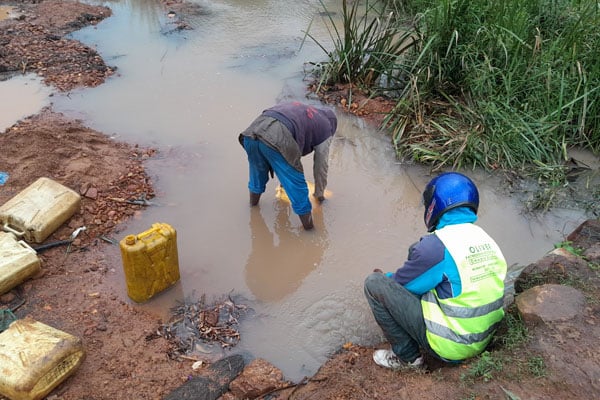Districts, NGO collaborate to tackle WASH challenges

A man fetches water from a well in Nyabubale village, Kiko town council in Kabarole District. Photo/Alex Ashaba
What you need to know:
- To address the water scarcity problem and ensure water quality, the district’s plan is to protect water source points.
- Some areas have already experienced reduced water volumes, while others are forced to fetch contaminated water, putting public health at risk.
Kabarole and Bunyangabu districts launched a joint partnership with International Water and Sanitation Centre (IRC) on August 1 in an effort to address Water, Sanitation, and Hygiene (WASH) challenges in Western Uganda.
With funding of Shs1.9 billion from the Waterloo Foundation, the partnership aims to strengthen sustainable WASH systems and provide clean and safe water for over 500,000 people living in the two districts.
These districts have been grappling with significant WASH challenges, including limited access to clean and safe water for their communities.
Mr Martin Watsisi, the regional WASH officer for IRC, explained that the funds will be utilised over three years until 2026 to establish vital infrastructure and bridge the existing WASH gaps in the districts.
One of the key objectives is to support town councils in implementing sanitation plans, a crucial step in achieving their WASH objectives.
The districts have faced challenges in making progress due to limited funding from the government. Despite signing a WASH master plan in 2018, issues such as open defecation and the use of traditional toilets persist in some town councils. The partnership with IRC brings hope for overcoming these challenges and achieving their WASH goals.
“If you look at the district masterplan, we have 7 years remaining to reach 2030, we committed ourselves to water sanitation and Hygiene for the people, in this partnership we shall support town councils to implement sanitation plans,” Mr Watsisi said.
The district leaders have been decrying inadequate funding from the government as a major hindrance to implementing planned activities related to WASH.
Mr James Ategeka, the chairman of Bunyangabu District, said the limited funding from the government has hindered their efforts to construct latrines in schools and improve sanitation facilities.
He highlighted the crucial role that support from NGOs and other organizations plays in realizing their WASH goals.
“As a government, we had failed to build latrines in some schools because of limited funding, in this new budget we only have Shs157 million allocated for the construction of 2 pit latrines in schools and one classroom block, in some schools, learners keep sharing toilet facilities,” He said.
To address the water scarcity problem and ensure water quality, the district’s plan is to protect water source points. Some areas have already experienced reduced water volumes, while others are forced to fetch contaminated water, putting public health at risk.
According to data from the Ministry of Water and Environment, only 27 percent of people in Uganda have access to water from protected springs, with 58 percent relying on shallow wells, 4 percent on boreholes, and 12 percent on public taps.
NGOs have played a significant role, covering 45 percent of the support for extending water to communities, while the central government and local government provided 10 percent and 38 percent, respectively.
With the recent budget cuts affecting the water sector in Kabarole, the district must now navigate tighter financial constraints in its pursuit of improved water infrastructure.
This new partnership between the IRC and the districts of Kabarole and Bunyangabu brings hope for creating sustainable WASH systems in the region. By leveraging the funding from the Waterloo Foundation, this collaboration aims to improve the living conditions and well-being of hundreds of thousands of people.




